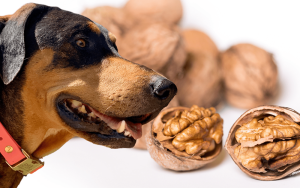Can Dogs Eat Honey? A Comprehensive Guide to Safe and Healthy Treats for Your Pup

Introduction
Honey has long been known for its natural sweetness and health benefits for humans. Whether it’s drizzling over a piece of toast or stirred into a warm cup of tea, honey is an ingredient that many of us enjoy. But what about our four-legged friends? Can
dogs eat honey? While honey is generally safe for most dogs in moderation, there are some important considerations every pet owner should know before sharing this sweet treat with their furry companions.
In this comprehensive guide, we will explore the benefits and potential risks of giving honey to dogs, how to introduce it safely into their diet, and some tips on how to use honey as a natural remedy for certain canine health issues. By the end of this
article, you’ll have a clear understanding of whether honey can be a beneficial addition to your dog’s diet or should be reserved for occasional indulgence.
What is Honey?
Honey is a natural substance produced by bees from the nectar of flowers. It’s made up of sugars like fructose and glucose, along with a variety of vitamins, minerals, and antioxidants. Throughout history, honey has been used not only as a food source
but also for its medicinal properties, ranging from soothing sore throats to healing wounds.
The potential health benefits of honey for humans are well-documented, but what about dogs? While dogs are not bees, they can still enjoy certain health benefits from honey when consumed in moderation. However, it’s important to understand that their
digestive systems are different, and not all food that’s safe for humans is suitable for dogs.
Can Dogs Eat Honey?
Yes, dogs can eat honey in moderation. Honey is non-toxic to dogs, and it can even offer some health benefits. However, before you start feeding your dog honey regularly, there are a few things to consider. First, it’s essential to understand that honey
is high in sugar, so it should only be an occasional treat rather than a regular part of your dog’s diet. Overconsumption of sugar can lead to health issues like obesity and dental problems.
Benefits of Honey for Dogs
When given in moderation, honey can provide a number of potential benefits for dogs. Here are a few key reasons why some pet owners choose to give honey to their dogs:
-
Natural Energy Boost
Honey is rich in natural sugars like fructose and glucose, which can provide a quick energy boost for active dogs. If you have a highly energetic dog, a small amount of honey might be a great way to give
them an extra burst of energy during a hike, walk, or play session. -
Relieves Cough and Sore Throat
Honey has natural antibacterial and soothing properties, making it an effective remedy for a dog with a cough or sore throat. It can help reduce irritation and promote healing, particularly in
cases of mild respiratory issues. However, if your dog has a persistent cough, it’s always best to consult with a veterinarian. -
Digestive Health
Some types of honey, especially raw honey, contain enzymes that can aid in digestion. In small amounts, honey can help soothe and regulate your dog’s digestive system, which can be beneficial for dogs with
minor stomach discomfort or digestive issues. -
Antioxidant Properties
Honey is packed with antioxidants, which can help combat the effects of free radicals in your dog’s body. Antioxidants are crucial for maintaining overall health and slowing down the aging process. By
feeding your dog small amounts of honey, you might contribute to their long-term health. -
Promotes Skin Health
Honey has been used for centuries as a natural remedy for wounds and skin conditions in humans. For dogs with dry skin or minor skin irritations, honey may be applied topically to help moisturize the skin
and promote healing. Some owners also use honey as an ingredient in homemade dog treats to enhance the flavor and nutritional content.
Potential Risks of Honey for Dogs
While honey has many benefits, there are also some potential risks that pet owners should be aware of. These risks primarily stem from overconsumption, allergies, or specific medical conditions. Here are some of the main concerns when giving honey to
dogs:
-
High Sugar Content
Honey is naturally high in sugar, which can contribute to obesity, diabetes, and other health problems in dogs. Dogs, like humans, are susceptible to weight gain when they consume too much sugar. This can
lead to joint problems, heart disease, and other complications over time. As a general rule, treats should make up no more than 10% of your dog’s daily caloric intake, so honey should be given sparingly. -
Potential for Allergic Reactions
Some dogs may have allergies or sensitivities to certain components in honey, particularly if the honey is raw or contains pollen. Symptoms of an allergic reaction can include itching, swelling,
digestive upset, or more severe issues like difficulty breathing. If you notice any signs of an allergic reaction after giving your dog honey, stop immediately and contact your veterinarian. -
Risk of Botulism in Puppies
One of the most important cautions when feeding honey to dogs is that puppies under one year old should never be given honey. Honey, especially raw honey, can contain spores of the bacteria Clostridium
botulinum, which can lead to botulism in young puppies. Botulism is a rare but serious condition that can cause paralysis and even death. Therefore, it’s safest to avoid giving honey to puppies or consult your veterinarian before offering
this treat. -
Dental Health Concerns
Just like other sugary foods, honey can contribute to plaque buildup and cavities if it’s not cleaned off your dog’s teeth after consumption. Regular dental care, including brushing your dog’s teeth and
providing dental chews, is essential to prevent the development of tooth decay or gum disease.
How Much Honey Can You Give Your Dog?
The key to safely feeding honey to your dog is moderation. While honey is generally safe for dogs, it’s important to avoid overdoing it. A good rule of thumb is to give your dog no more than one teaspoon of honey per 10 pounds of body weight per day.
For example:
- A 10-pound dog can have up to 1 teaspoon of honey per day.
- A 30-pound dog can have up to 3 teaspoons of honey per day.
If you’re introducing honey into your dog’s diet for the first time, start with a small amount to see how your dog reacts. Watch for any signs of gastrointestinal distress or allergic reactions, and consult your veterinarian if you have any concerns.
How to Safely Serve Honey to Dogs
There are a few different ways you can incorporate honey into your dog’s diet:
-
As a Treat
You can give your dog a small spoonful of honey as a treat, or drizzle it over their regular food. If your dog enjoys the taste, they may appreciate the sweet addition to their meals. -
Homemade Dog Treats
Many pet owners use honey as a key ingredient in homemade dog treats. Honey can be mixed with whole wheat flour, oats, and other dog-safe ingredients to create tasty, nutritious snacks. Just be sure that
the treat recipe doesn’t include any harmful ingredients like chocolate, raisins, or xylitol. -
Honey for Health Benefits
If your dog has specific health concerns, such as a cough or digestive issues, a small amount of honey can be used as a natural remedy. For example, you can mix honey with warm water and give it to
your dog to soothe a sore throat. However, always consult your veterinarian before using honey as a treatment for any health condition. -
Topical Application
For minor skin irritations, honey can be applied directly to your dog’s skin. Just make sure to clean the area before applying honey, and only use a small amount to avoid a sticky mess.
Conclusion
Honey can be a safe and beneficial treat for most dogs when given in moderation. Its natural energy-boosting properties, antioxidant content, and soothing effects on the throat and digestive system make it a great occasional snack for your pup. However,
it’s important to be mindful of the sugar content and potential risks, particularly for puppies and dogs with specific health conditions like diabetes or obesity.
If you’re considering adding honey to your dog’s diet, always consult your veterinarian, especially if your dog has any existing health concerns. And remember, while honey can offer some health benefits, it should never replace a balanced diet or proper
veterinary care. So, next time you reach for the honey jar, you can feel good about sharing a small amount with your dog – but remember, moderation is key!
FAQs
-
Is honey safe for puppies?
No, puppies under one year old should not consume honey due to the risk of botulism. -
Can honey help with my dog’s allergies?
Honey may help with minor allergy symptoms due to its anti-inflammatory properties, but it should not be used as a replacement for prescribed allergy treatments. -
How do I know if my dog is allergic to honey?
Watch for signs of an allergic reaction, such as itching, swelling, or digestive upset. If these symptoms occur, stop giving honey to your dog and consult your veterinarian. -
Can honey be part of my dog’s daily diet?
Honey should only be an occasional treat. It’s high in sugar and should not make up a significant part of your dog’s diet.
By understanding the benefits and risks of honey for dogs, you can make an informed decision about whether to include this natural treat in your pet’s diet. Always remember that the health and safety of your dog should always come first!






